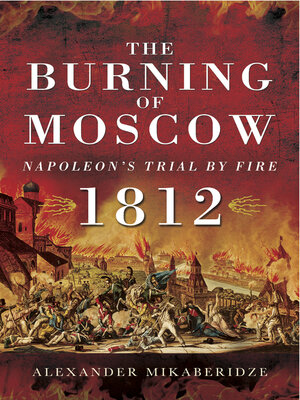
Sign up to save your library
With an OverDrive account, you can save your favorite libraries for at-a-glance information about availability. Find out more about OverDrive accounts.
Find this title in Libby, the library reading app by OverDrive.



Search for a digital library with this title
Title found at these libraries:
| Loading... |
A comprehensive account of the fiery destruction of Moscow during the Napoleonic Wars—and the Russians’ motives for starting the blaze.
As soon as Napoleon and his Grand Army entered Moscow, on 14 September 1812, the capital erupted in flames that eventually engulfed and destroyed two thirds of the city. The fiery devastation had a profound effect on the Grand Army, but for thirty-five days Napoleon stayed, making increasingly desperate efforts to achieve peace with Russia. Then, in October, almost surrounded by the Russians and with winter fast approaching, he abandoned the capital and embarked on the long, bitter retreat that destroyed his army. The month-long stay in Moscow was a pivotal moment in the war of 1812 – the moment when the initiative swung towards the Tsar’s armies and spelled doom for the invading Grand Army – yet it has rarely been studied in the same depth as the other key events of the campaign.
Alexander Mikaberidze, in this third volume of his in-depth reassessment of the war between the French and Russian empires, emphasizes the importance of the Moscow fire and shows how Russian intransigence sealed the fate of the French army. He uses a vast array of French, German, Polish and Russian memoirs, letters and diaries as well as archival material in order to tell the dramatic story of the Moscow fire. Not only does he provide a comprehensive account of events, looking at them from both the French and Russian points of view, but he explores the Russians’ motives for leaving, then burning their capital. Using extensive eyewitness accounts, he paints a vivid picture of the harsh reality of life in the remains of the occupied city and describes military operations around Moscow at this turning point in the campaign.
Praise for The Burning of Moscow
“Important. . . . Fascinating. . . . A book that you must read.” —The Napoleonic Historical Society
“Although authored by an academic, this book is written in an easy to read style without recourse to the overly academic language that can so often bore the reader. . . . Overall this title wholeheartedly deserves a five out of five star rating, and should occupy a space in the library of anyone interested in the Napoleonic Wars.” —Mark Simner, author of The Lion and the Dragon






